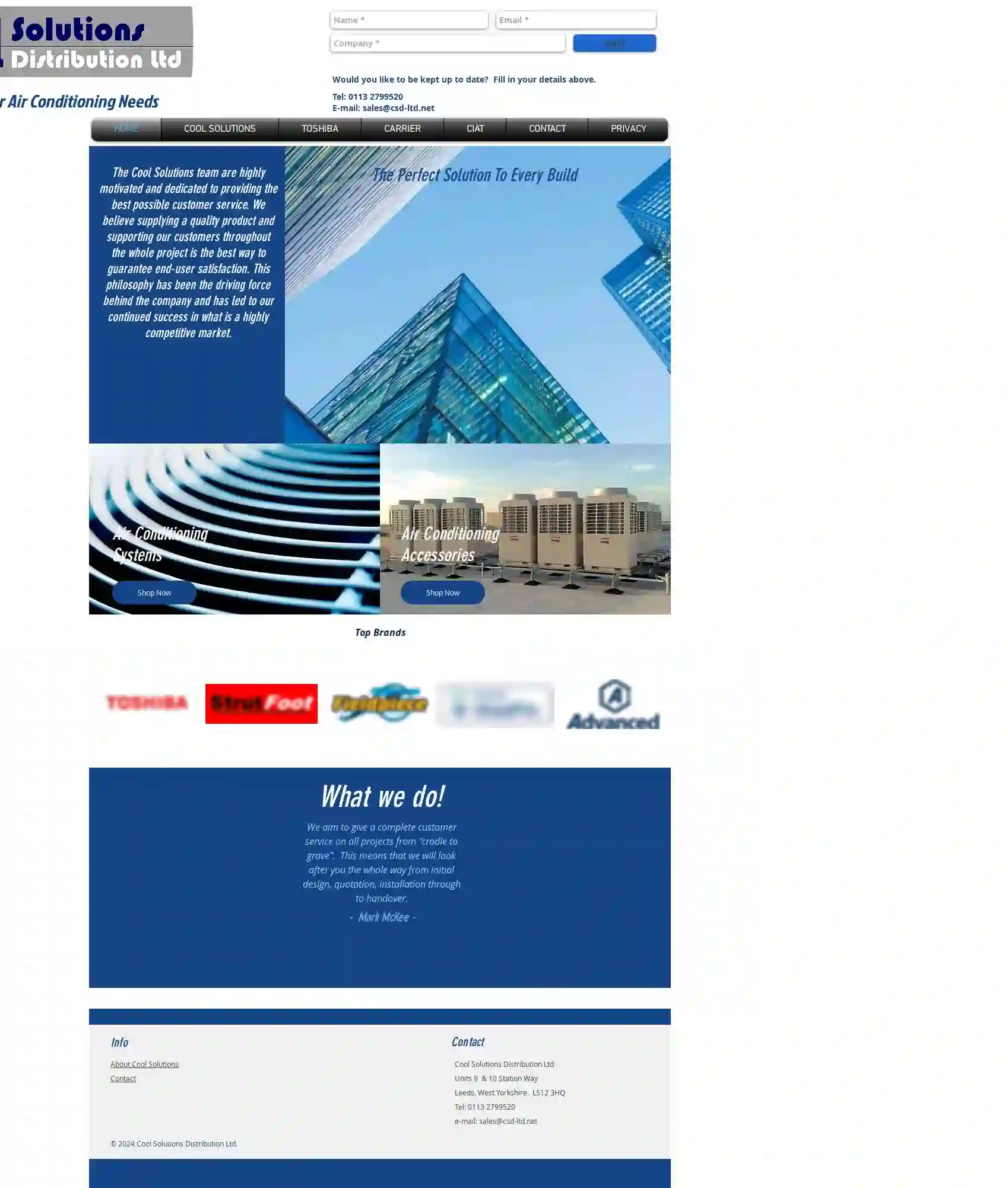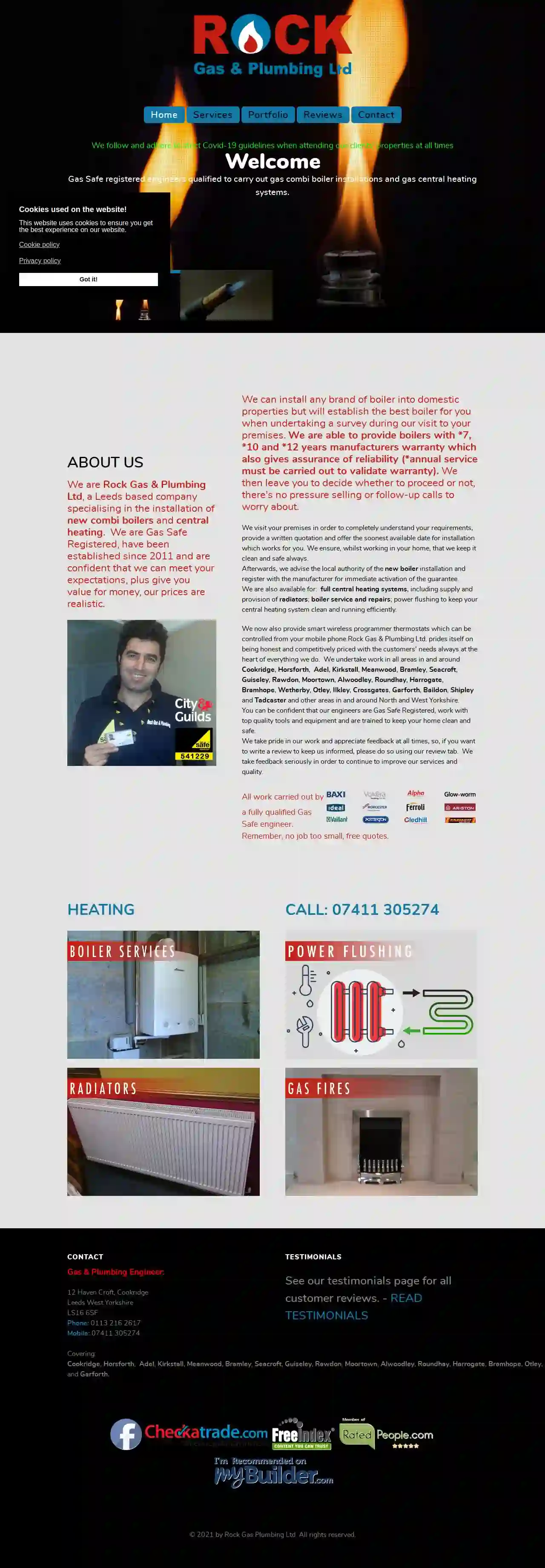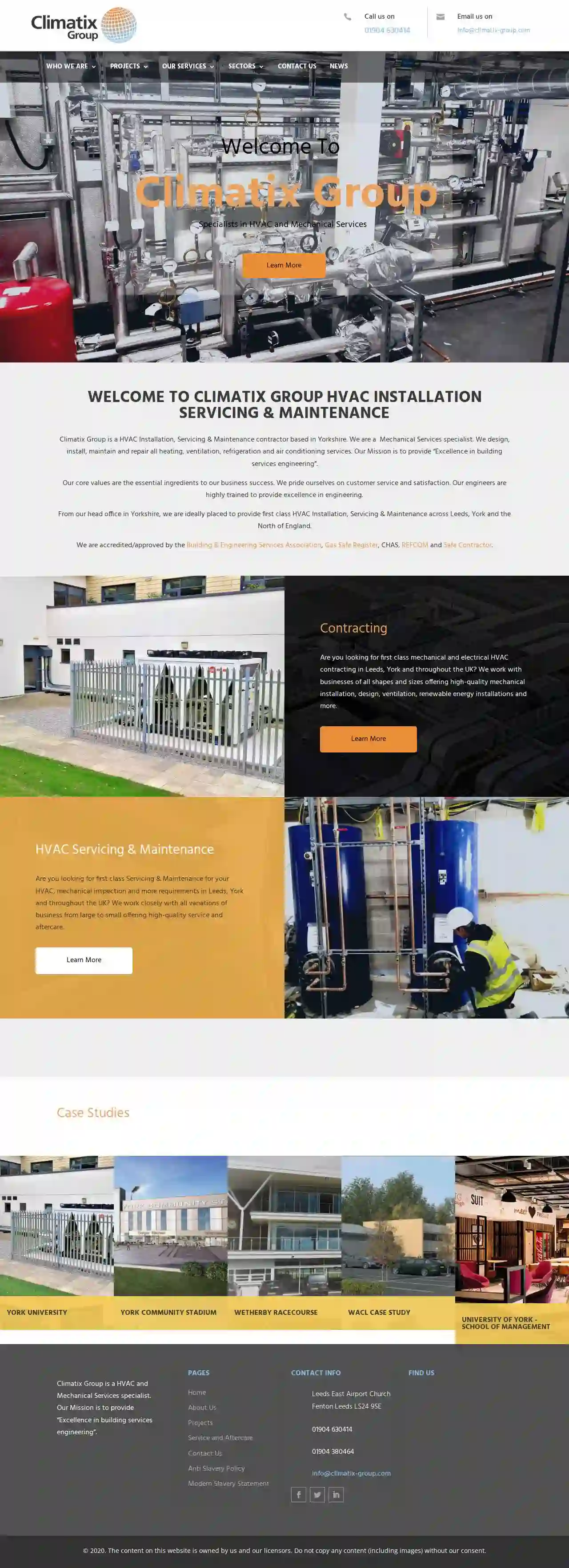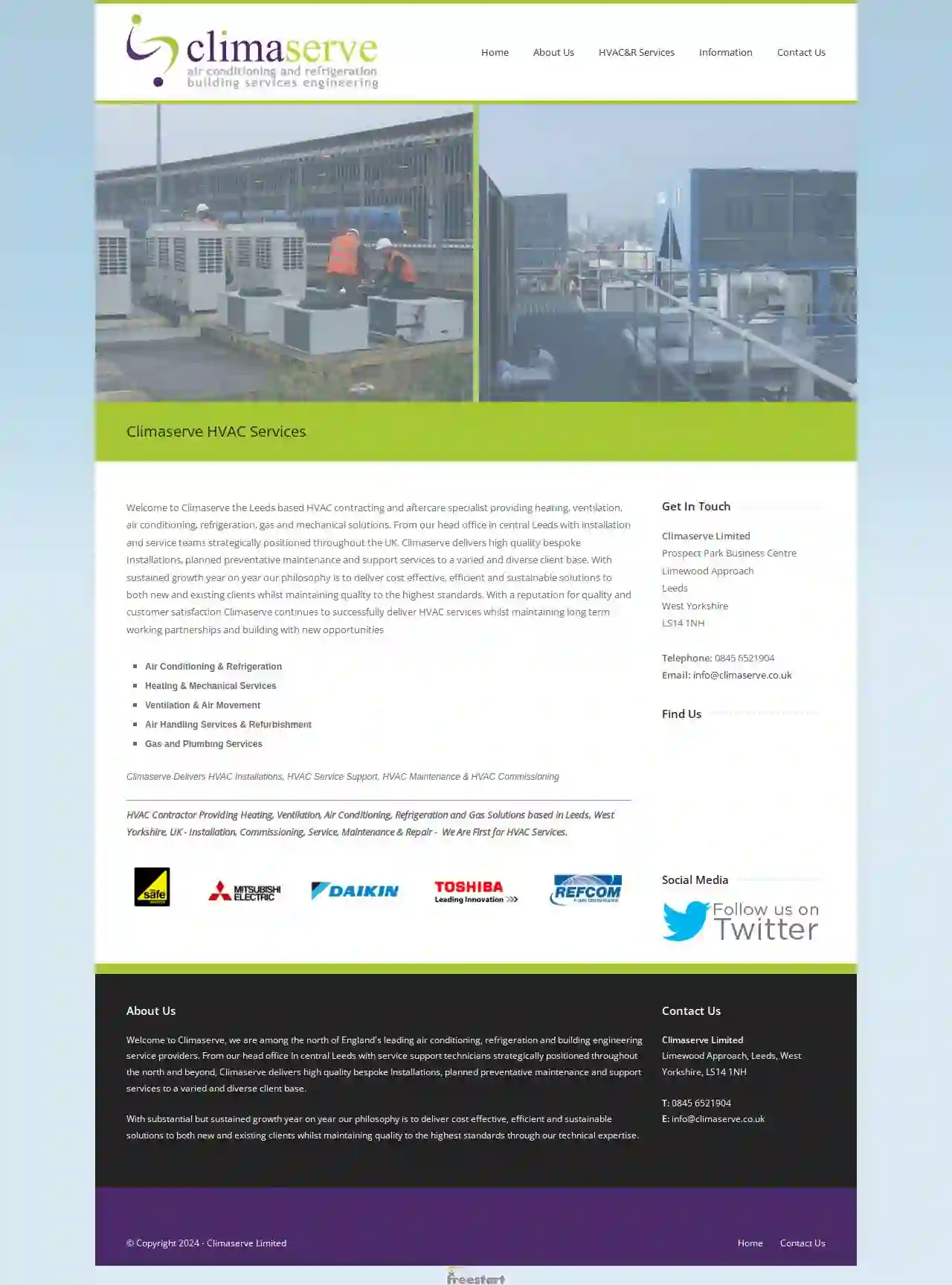Emergency HVAC Farsley
Find the best After Hours HVAC in Farsley
Get multiple Emergency HVAC quotes for your project today! Compare profiles, reviews, accreditations, portfolio, etc... and choose the best service.

Cool Solutions Distribution
Units 9 & 10 Station Way, Leeds, LS12 3HQ, GBAt Cool Solutions, we are a team of highly motivated and dedicated professionals who are committed to providing the best possible customer service. We believe in supplying a quality product and supporting our customers throughout the whole project to guarantee end-user satisfaction. Our philosophy has been the driving force behind our continued success in a highly competitive market. We aim to give a complete customer service on all projects from 'cradle to grave', looking after our customers from initial design, quotation, installation through to handover.
- Services
- Why Us?
- Our Team
- Gallery
Get Quote
Linear Control Systems Ltd
3.85 reviewsLowfields Road, No 2, United Business Park, Leeds, LS12 6UB, GBLinear Control Systems Ltd has been a leading provider of Building Energy Management Systems (BEMS) since 2005. We specialize in designing, installing, and maintaining bespoke BEMS solutions that help our clients monitor and control their energy consumption and occupant comfort. Our mission is to deliver high-quality services at competitive prices, ensuring customer satisfaction through timeliness, attention to detail, and a service-minded approach. We combine cutting-edge building strategy and BMS knowledge to develop efficient and effective solutions that keep businesses ahead of the curve. We are committed to promoting a more sustainable future and helping our clients achieve lower operating costs through smarter energy usage, advanced building automation, and sophisticated monitoring.
- Services
- Why Us?
- Accreditations
- Our Team
- Testimonials
- Gallery
Get Quote
Lion Heating (Leeds) Ltd
54 reviewsLeeds, GBLion Heating is a Leeds based heating and plumbing company, specialising in a range of installation and maintenance services for residential and commercial customers. We are a Yeadon based heating and plumbing company focusing on high standards and a professional service. We stay up to date with current gas regulations and manufacturer training to ensure you’re in safe hands with Lion Heating. As specialists in the Service, Repair and Testing of gas appliances, we have completed various manufacturer training and testing procedures. We have extensive experience of working with a wide range of appliances.
- Services
- Why Us?
- Our Team
- Testimonials
- Gallery
Get Quote
ROCK GAS & PLUMBING LTD
528 reviews12 Haven Croft, Leeds, LS16 6SF, GBWelcome to Rock Gas & Plumbing Ltd, a Leeds based company specialising in the installation of new combi boilers and central heating. We are Gas Safe Registered, have been established since 2011 and are confident that we can meet your expectations, plus give you value for money, our prices are realistic. We can install any brand of boiler into domestic properties but will establish the best boiler for you when undertaking a survey during our visit to your premises. We are able to provide boilers with *7, *10 and *12 years manufacturers warranty which also gives assurance of reliability (*annual service must be carried out to validate warranty). We then leave you to decide whether to proceed or not, there's no pressure selling or follow-up calls to worry about. We visit your premises in order to completely understand your requirements, provide a written quotation and offer the soonest available date for installation which works for you. We ensure, whilst working in your home, that we keep it clean and safe always. Afterwards, we advise the local authority of the new boiler installation and register with the manufacturer for immediate activation of the guarantee. We are also available for: full central heating systems, including supply and provision of radiators; boiler service and repairs; power flushing to keep your central heating system clean and running efficiently. We now also provide smart wireless programmer thermostats which can be controlled from your mobile phone. Rock Gas & Plumbing Ltd prides itself on being honest and competitively priced with the customers' needs always at the heart of everything we do. We undertake work in all areas in and around Cookridge, Horsforth, Adel, Kirkstall, Meanwood, Bramley, Seacroft, Guiseley, Rawdon, Moortown, Alwoodley, Roundhay, Harrogate, Bramhope, Wetherby, Otley, Ilkley, Crossgates, Garforth, Baildon, Shipley and Tadcaster and other areas in and around North and West Yorkshire.
- Services
- Why Us?
- Accreditations
- Our Team
- Testimonials
- Gallery
Get Quote
AC Heating PLC Emergency Boiler Repair Middleton
4.58 reviews66a Middleton Park Rd, Middleton, LS10 3SA, GBAC Heating PLC Emergency Boiler Repair Middleton is a family run plumbing business, providing Middleton area with a friendly professional service for all your plumbing and boiler repair requirements. Our 24 hour emergency plumber Middleton. We specialize in all types of Plumbing services including Emergency Plumbing call outs, Boiler Repair, Boiler installation, Boiler servicing and full heating installations. AC Heating PLC Emergency Boiler Repair Middleton repair pride ourselves as being one of the area’s premier 24 hour emergency Plumbing companies. When a problem occurs that requires an immediate response we offer complete solutions including Boiler repairs and waterleak repairs throughout Middleton 24 hours a day, 365 days a year. Highly skilled local Plumbers are on standby with fully equipped vans containing all the necessary equipment to carry out any Plumbing service. With our local Middleton engineers you know you’re in safe hands. We have had many recommendations through word of mouth. This is due to our policy of putting customer satisfaction as well as safety, above all else. Please contact one of are friendly office staff now to book a appointment.
- Services
- Why Us?
- Accreditations
- Gallery
Get Quote
Acute Heating
19-21 Somers St, Leeds, LS1 2RG, GBAcute Heating is a leading provider of commercial and residential gas, heating, and boiler services across the UK. With over 20 years of experience, our team of highly skilled professionals is dedicated to delivering exceptional customer service, fast response times, and affordable rates. We specialize in installation, maintenance, and repair services for a wide range of heating systems, including boilers, water heaters, and commercial heating pumps. Acute Heating prides itself on utilizing the latest digital technology to modernize how you stay safe and warm. We work with both homes and businesses, ensuring your vital systems run smoothly 24/7. Contact us today for a free quote and experience the Acute Heating difference.
- Services
- Why Us?
- Testimonials
- Gallery
Get Quote
Calverley Control Installations Ltd
54 reviewsRoyds Close, Blacup House, Leeds, LS12 6LL, GBWith over 25 years of experience in Building Management Systems, Calverley Control Installations are ideally placed to provide design, manufacturing, installation and software engineering to suit the requirements of the most demanding projects. We pride ourselves in our ability to deliver a high quality control solution from initial concept through to final handover and training. We operate an open and honest policy with all our clients as we like to think that a client is for life and not just for one project. Year Established: 2003 Projects Completed: 57 Control Panels created: 365 Projects a year: 285
- Services
- Why Us?
- Testimonials
- Gallery
Get Quote
Climatair
Leeds East Airport Church Fenton, Leeds, LS24 9SE, GBClimatix Group is a HVAC Installation, Servicing & Maintenance contractor based in Yorkshire. We are a Mechanical Services specialist. We design, install, maintain and repair all heating, ventilation, refrigeration and air conditioning services. Our Mission is to provide “Excellence in building services engineering”. Our core values are the essential ingredients to our business success. We pride ourselves on customer service and satisfaction. Our engineers are highly trained to provide excellence in engineering. From our head office in Yorkshire, we are ideally placed to provide first class HVAC Installation, Servicing & Maintenance across Leeds, York and the North of England. We are accredited/approved by the Building & Engineering Services Association, Gas Safe Register, CHAS, REFCOM and Safe Contractor.
- Services
- Why Us?
- Accreditations
- Gallery
Get Quote
Morley Ventilation
51 reviewsMorley, Leeds, 25 Melbourne Street, LS27 8BG, GBAt Morley Ventilation, we take pride in our commitment to keeping Yorkshire folk at just the right temperature. As specialists in ductwork, we bring unparalleled expertise to ensure optimal ventilation solutions for your spaces. Our team of skilled professionals excel in installing ductwork tailored to meet your specific needs. Whether it’s a commercial, industrial, or residential project, we have the expertise to deliver solutions. Morley Ventilation goes beyond standard ductwork. We are dedicated to creating environments that are not only well-ventilated but also precisely temperature-controlled. Trust us to find the perfect balance for your comfort. With years of experience in the industry, our craftsmanship is second to none. We use the latest technology and industry best practices to ensure that every project is executed with precision and care. We are Northern Ductwork Experts.
- Services
- Why Us?
- Gallery
Get Quote
Climaserve Limited
3.73 reviewsProspect Park Business Centre, Limewood Approach, Leeds, LS14 1NH, GBWelcome to Climaserve, a Leeds-based HVAC contracting and aftercare specialist providing heating, ventilation, air conditioning, refrigeration, gas and mechanical solutions. From our head office in central Leeds with installation and service teams strategically positioned throughout the UK, Climaserve delivers high-quality bespoke installations, planned preventative maintenance and support services to a varied and diverse client base. With sustained growth year on year, our philosophy is to deliver cost-effective, efficient and sustainable solutions to both new and existing clients whilst maintaining quality to the highest standards. With a reputation for quality and customer satisfaction, Climaserve continues to successfully deliver HVAC services whilst maintaining long-term working partnerships and building with new opportunities.
- Services
- Why Us?
- Gallery
Get Quote
Over 12,692+ HVAC Contractors on our platform
Our HVAC experts operate in Farsley and beyond!
HVACCompaniesHub has curated and vetted Top HVAC Contractors arround Farsley. Find the most reliable contractor today.
Frequently Asked Questions About Emergency HVAC Services
- Raise Your Thermostat: Set your thermostat to a higher temperature when you’re away. Consider using a programmable or smart thermostat.
- Use Fans: Fans can circulate air and make you feel cooler, even at a higher thermostat setting.
- Close Window Coverings: Keep curtains or blinds closed during the day to block out sunlight.
- Limit Heat-Generating Activities: Avoid running heat-producing appliances (ovens, dryers) during the hottest parts of the day.
- Annual AC Maintenance: Schedule yearly maintenance for your air conditioner to ensure it's running efficiently.
- Plant Shade Trees: Planting trees around your home can provide natural shade and reduce heat gain.
- A sulfurous odor
- Hissing or whistling sounds near gas lines or appliances
- Blowing dirt or bubbles in standing water
- Dead or discolored vegetation near gas lines
- Physical symptoms like dizziness, nausea, or headaches
What is a smart thermostat, and how can it save me money?
How can I cool my home efficiently?
How do I know if I have a gas leak?
How long does it take for an emergency HVAC technician to arrive?
What is a smart thermostat, and how can it save me money?
How can I cool my home efficiently?
- Raise Your Thermostat: Set your thermostat to a higher temperature when you’re away. Consider using a programmable or smart thermostat.
- Use Fans: Fans can circulate air and make you feel cooler, allowing you to raise the thermostat a few degrees.
- Close Window Coverings: Keep curtains or blinds closed during the day to block out sunlight.
- Limit Heat-Generating Activities: Avoid running heat-producing appliances (ovens, dryers) during the hottest parts of the day.
- Annual AC Maintenance: Schedule yearly maintenance for your air conditioner to ensure it's running efficiently.
- Plant Shade Trees: Planting trees around your home can provide natural shade and reduce heat gain.
How do I know if I have a gas leak?
- A sulfurous odor
- Hissing or whistling sounds near gas lines or appliances
- Blowing dirt or bubbles in standing water
- Dead or discolored vegetation near gas lines
- Physical symptoms like dizziness, nausea, or headaches